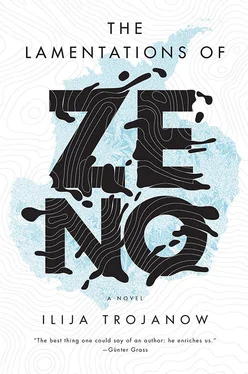The move from the house in Solln to a furnished one-room apartment in Moosbach was very different than the previous relocation. Everything I still chose to call my own fit in Hölbl’s VW SportWagen. The only books I took were ones I had practically learned by heart during the past few years, the rest wound up in the recycling bin, I went there every day for weeks lugging two heavy canvas shopping bags, one in each hand, the CDs had to be taken to a special station for used electronics that was a longer walk, but they weren’t as heavy. On my way I remembered what Lama Boltzmann had told us about a library in a Tibetan monastery with scrolls that no one had been allowed to inspect for hundreds of years. The priests would look at the stacked documents and make prognostications about the future. In light of this tradition my trip to the used electronic collection point struck me as a kind of Buddhist pilgrimage: we need texts that remain unread on purpose, music that is intentionally not listened to, trees mountaintops brooks glaciers that are deliberately left in peace. As the summer dragged on I spent my days reading in the Moosach apartment with a sense of liberation, freed from the besetting pressure of thousands of books. My only concern was what to do with the proceeds from the sale of the house, a substantial sum even after I had transferred half to Helene. Once again I abandoned myself to the tried-and-true texts, inspired by their stubborn ambition to appeal to my conscience, which is presumably why they continue to be so esteemed, even though they try as hard as they can to change the way people think. The classics are allowed to shine light into the darkness and fashion words worthy of chiseling into stone facades. Living authors, on the other hand — so I discovered each time I opened the newspaper — are expected to have more modest aims, to motivate here or agitate there, but under no circumstances should they propose to change the world. So how are people expected to stir things up during their lifetime? Shaming doesn’t work, because everyone is ready to publicly confess their disgraceful deeds, pathos doesn’t work because everything is downplayed. And violence? Violence is the only language that has yet to be plastered with the ads and logos of sponsors. Left to our own devices, we understand only the violence directed against us: violence done to others remains incomprehensible, unheard, voiceless — nothing more than a rasping cough in a throat without speech, or at best a stutter. That’s the kind of sentence I penned in the margins as I bided my time in my cozily narrow apartment in Moosach, reading my own notes and asking myself whether I had found a reasonable response to the unreasonable demands of our time, or if I, too, had been infected by the idiocy of the age. One thing seemed clear, though, namely that true liberation can only succeed through a creative act. Occasionally I wrote emails. Even in the dreariest weeks I made sure to keep up my correspondence with a handful of colleagues I really respected, for instance Shiva Ramkrishna from the JNU in Delhi, who took a devilish delight in interpreting the latest scientific findings through the prism of early Sanskrit myths, in his opinion the melting of glaciers and the impending threat of the Ganges running dry had been foreseen, the ancient prophecies foretold that the holy river would one day grow tired of the countless sins that had been washed away in its waters and would disappear below the earth, even our gods will change, Shiva wrote in his latest email, you can get a taste of things to come on the Siachen Glacier, where the soldiers are so completely dependent on helicopters for food and protection that they are inclined to see them as omnipotent saviors, their only hope for deliverance from the mind-addling tour of duty 20,000 feet above sea level, and have even begun to worship the machines, with gyrating light and ancient chants that they have only had to adapt slightly. Why shouldn’t God be a helicopter, I answered Shiva, that would say something for the range of religious imagination, Christianity’s biggest mistake was fashioning God in man’s own image. Once a week I interrupt my musings to talk to Paulina over Skype, at a prearranged time. I don’t appreciate surprise phone calls, not from Hölbl, who absolutely refuses to understand that the recollection of Paulina is far more erotically satisfying than the sight of some scantily clad long-legged female from one of the shantylands newly accepted into the European Union, nor from my bank advisor (the title says it all, the man advises his bank at the cost of his client), who has tried to fob off everything imaginable on me including the lousiest bonds and securities (and what a phony word that is, right up there with “insurance”). But his efforts are in vain, he still hasn’t grasped that he’s at a complete disadvantage since I don’t need to convert my time into money. Sometimes I’m so annoyed I simply hang up. I stay away from the Alps, I don’t venture out of town, either for little outings nearby or longer excursions farther away — there isn’t any nature left in my country, I might as well let myself be moved by the cultural landscapes printed between two book covers.
Glacier fronts gnawed through and through, as though the sea were a rodent. The sky offers four separate dramas, the clouds above the ocean are different than the ones over ice that’s more than four kilometers thick, puffy cumuli ghost around the islands, while just above us is a blanket of gray. We are sailing through the Avenue of the Ice Giants. Spiky blocks of ice keep watch, their ribbed bodies chiseled out of alabaster. Hammered walls of blue copper and a single albatross, as gentle as a line of chalk, a hundred solitudes away from his nest. That’s you, Zeno, plunging at free-fall speed into nothingness, a moment later and you will no longer appear in the drawing.

Suspected of … well what exactly? Where wood is chopped splinters must fall. What made him so furious? Actually there was hardly anything that didn’t make him furious. That’s not very helpful. I’ll give you an example, last year the ship was completely overbooked for this one expedition, the lecturers had to be put up two to a cabin, we were running low on drinking water because people were consuming too much, and for the desalination to kick in the ship has to have a speed of at least fifteen knots, so every night we had to sail to Deception Island and back just to have enough water for breakfast, and that went on several nights in a row, if we’d stayed in the Antarctic one more day we would have run out of fuel. And? That really made him furious. Yes, it’s fluttering right here in front me in the train station, the pigeon isn’t totally white, you’re right, it has a few black spots and two brown stripes, there, on the sides, I have no idea what you call it. We can get original footage from a Columbian TV that had a crew on board, we haven’t seen stuff that strong since the incident with the tanker, remember, the one that crashed into the harbor? The workers on the dock saw it heading straight at them, they had fifteen minutes to clear out what they could. Dry fodder, profit is short term, worry is for life, we should rather look at the whole thing from a psychological perspective, student fodder, it’s too much to ask people to behave with a mind to a future they won’t live to see, hiccup, I’m a pious skeptic, dry cough, I have pills for everything, some make you bigger others make you smaller and some let you forget, and the correct answer is: the thickest book is the book of world records, congratulations, I thank you all, canned meat, I love you all BREAKING NEWS HIJACKED SHIP BOARDED BY SPECIAL FORCES BREAKING NEWS HIJACKED SHIP BOARDED BY SPECIAL FORCES is in large measure suspect
Читать дальше













